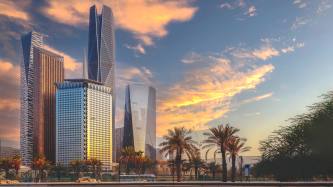Financing Iraq’s green transition and supporting Iraq’s banking sector are key priorities for the European Bank for Reconstruction and Development (EBRD), as it recently announced that Iraq had become its latest shareholder.
The country’s membership — folded into the bank’s southern and eastern Mediterranean (Semed) region — forms part of the EBRD’s wider shareholder expansion, including into sub-Saharan Africa.
Bringing the EBRD’s total number of shareholders to 74, Iraq can now apply to become a recipient economy of EBRD’s finance and policy support. So, what types of investment or support might it receive from the EBRD?
According to Heike Harmgart, EBRD’s managing director for the Semed region, as part of Iraq’s transition to a greener economy, a key priority for the country lies in its diversification strategy away from oil and gas.
Over the last decade, oil revenues have accounted for more than 99% of Iraq’s exports, 85% of the government’s budget, and 42% of gross domestic product, according to the World Bank.
While oil will continue to form a large part of Iraq’s economy, the key political and economic priority is to diversify both energy and industry, Ms Harmgart says. “We see solar and wind projects as very important in Iraq, but also the wider diversification of its industrial base.”
Iraq is the fifth-most vulnerable country to climate breakdown, according to the UN. It is particularly affected by rising temperatures, insufficient and diminishing rainfall, droughts, water scarcity and flooding.
As well as supporting renewables projects and electricity reform, the EBRD will develop public-private partnerships to mitigate climate impacts, like improving access to water, Ms Harmgart says.
“This could include the replacement of inefficient water pumps with energy efficient water pumps — financing both the public and private sector — but also working with the government on the policy side,” Ms Harmgart says.
Most of the EBRD’s investments flow to the private sector, with 25% of investments earmarked for the public sector.
The multilateral development bank can support Iraq with policy frameworks for public-private partnerships and power purchase agreements in the renewable and energy sectors, Ms Harmgart says. “If the policy environment and the legislative environment is predictable, reliable and tested, more companies globally may also enter with green technologies.”
Iraq’s government has a willingness to move towards a green transition, but it hasn’t yet materialised, Ms Harmgart says. “I want to see the membership with EBRD as a signal to a much more focused transition towards a greener economy.”
Huge potential for Iraqi banking sector
According to the World Bank, Iraq must accelerate the pace of economic diversification, sustainable growth and job creation. As such, industries outside of the oil and gas sectors are a top priority, with the EBRD looking to Iraq’s banking sector as part of its wider ‘holistic’ economic and private sector growth.
“Iraq has huge opportunities for private banks,” Ms Harmgart says. “In recent years, some Iraqi banks were purchased by Jordanian banks; moving forward, we see growing interest from regional players in the Iraqi banking market.”
The EBRD can contribute by investing in banking intermediation, she adds. “We want to help banks better reach small and medium-sized enterprises [SMEs] and help businesses to upgrade their processes — for example, with more digital products.”
With Iraq’s lending sector remaining predominantly relationship based, Ms Harmgart says the EBRD will likely develop training and upskilling for SMEs and banks to reduce reliance on personal guarantees.
“There’s a huge potential for the Iraqi banking sector. This could really unlock growth in the economy, in particular for smaller and medium-sized industrial value chains,” Ms Harmgart says.
However, change in Iraq requires genuine “political will to reform processes” regardless of sector, says Renad Mansour, senior research fellow at Chatham House’s Middle East and North Africa Programme, and project director of its Iraq Initiative. “Multilateral development banks are well aware of the structural constraints to any genuine sustainable development in Iraq,” Mr Mansour says.
In 2022, Iraq scored 23/100 on Transparency International’s Corruption Perceptions Index (a score of 0 is highly corrupt and 100 is very clean). While combating corruption is one of the biggest challenges in Iraq, Ms Harmgart says the EBRD is experienced in challenging markets.
“It’s about the willingness to change and the willingness to improve practices,” she says, adding that digitalisation across the banking sector may help mitigate corruption. “We have found in many countries that digitalisation is a great way of reducing corruption,” Ms Harmgart explains. “It increases transparency, the ease of doing business without intermediaries and access to licensing.”












